2022 Gold & White Honors Gala
2022 Honorees
Doug Hooker, ME 78, MS TSP 85
Executive Director, Atlanta Regional Commission
Dean Griffin Community Service Award
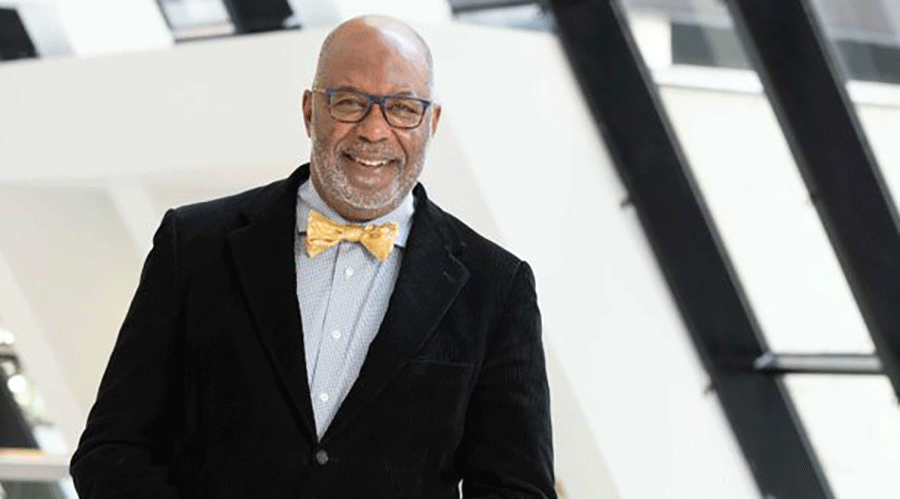 Through a life of service in the public and private sectors, Doug Hooker has left an indelible mark on the city of Atlanta and his alma mater. Although he plans to retire as executive director of the Atlanta Regional Commission (ARC) this March, he’s setting the tempo for a busy next chapter that’s just as focused on the community and the Institute as his career has been. A talented musician, Hooker will premiere a symphony that he wrote, titled “Without Regard to Sex, Race, or Color,” at Tech’s Ferst Center for the Arts for the start of Black History Month this February.
Through a life of service in the public and private sectors, Doug Hooker has left an indelible mark on the city of Atlanta and his alma mater. Although he plans to retire as executive director of the Atlanta Regional Commission (ARC) this March, he’s setting the tempo for a busy next chapter that’s just as focused on the community and the Institute as his career has been. A talented musician, Hooker will premiere a symphony that he wrote, titled “Without Regard to Sex, Race, or Color,” at Tech’s Ferst Center for the Arts for the start of Black History Month this February.
While a student, Hooker was president of the Institute’s chapter of the National Society of Black Engineers, growing it into one of the strongest chapters in the country. After graduating, he went on to several leadership positions serving Atlanta and its people. That includes leading the city’s Department of Public Works during the 1996 Olympics. The mayor and city council of Atlanta have even declared a Doug Hooker Day Proclamation in recognition of his service.
Over the last 10 years, Hooker has led the ARC, driving cultural changes across the organization. Under his leadership, the organization played a key role in securing Atlanta’s water supply for decades to come—the result of years of work defending against litigation from neighboring states. “It’s a quiet victory, but water is the foundation for life and community, and the ARC has been a critical part of coordinating that use of water,” Hooker says.
In addition, under Hooker’s leadership, the ARC paved the way for Aerotropolis Atlanta, a public-private partnership focused on increasing economic development for communities near Atlanta’s Hartsfield-Jackson Airport. Deeply passionate about education, Hooker also helped foster a partnership between ARC, civic organizations, and school districts in Atlanta that led to the founding of an educational nonprofit, Learn4Life.
A proud Jacket, Hooker has served on numerous organizations at the Institute. He serves on the School of City and Regional Planning Advisory Board and the Ivan Allen College Advisory Board and is a past member of the Alumni Trustee Board, the CEE Advisory Board, and the Georgia Tech Advisory Board.
“I couldn’t say enough about Tech’s value in my life both personally and professionally,” Hooker says. “With my engineering degree, I felt better prepared than colleagues from other institutions. And years later, my public policy degree gave me the framework to navigate and interpret for people who were in both public and private sectors, but who only understood one of them. And to do so in a way that helped us find real solutions.”
Jacquelyn Renée Schneider, BC 06, MBA 18
Manager at Jabian Consulting
Outstanding Young Alumni
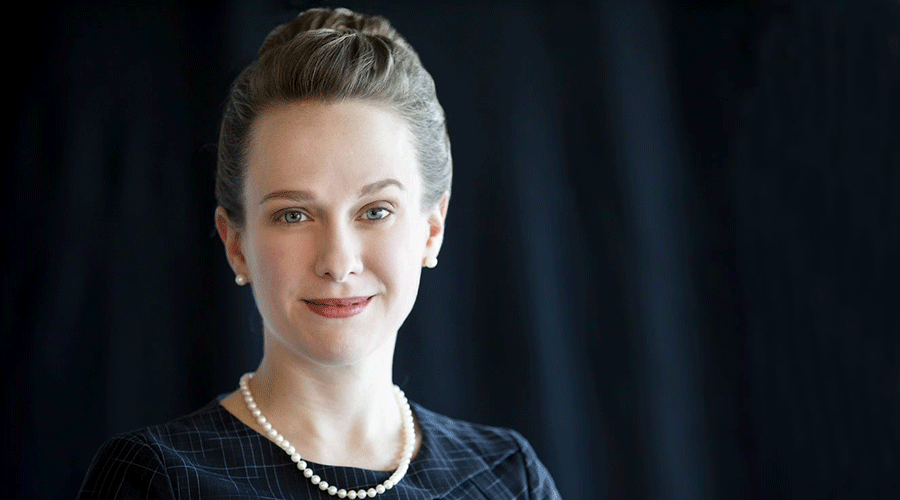 Jacquelyn Renée Schneider’s meteoric rise in management consulting hasn’t slowed down for one second her commitment to service. Schneider was able to attend college through the support of her family and Georgia’s HOPE Scholarship and graduate—becoming the first in her family to do so.
Jacquelyn Renée Schneider’s meteoric rise in management consulting hasn’t slowed down for one second her commitment to service. Schneider was able to attend college through the support of her family and Georgia’s HOPE Scholarship and graduate—becoming the first in her family to do so.
“While Tech requires a lot of hard work and builds resilience, people really believed in me and helped make the Georgia Tech dream a reality,” Schneider says.
Now a Double Jacket, she’s keeping the door open for future Jackets with a planned gift for an MBA endowment fund that gives preference to women who are first in their families to attend college and to women from underrepresented racial and ethnic minorities.
After graduating in 2006 from the School of Building Construction, Schneider set out to pursue a career in academia, earning master’s degrees from Johns Hopkins University and the University of California, Davis. Missing the fast-paced environment of consulting, she founded Aigu Consulting in 2014, which provides coaching for clients on career search, career strategy, and authentic leadership. In 2018, she returned to Tech to earn her MBA from the Scheller College of Business and served as the student body president for the Evening MBA students.
“Being able to participate in student leadership was an immense teaching experience for me,” Schneider says. “That 365 days, 24/7 leadership and being able to see the dean’s and faculty’s vision for the future was an incredible experience.”
Schneider’s service also extends to alumni. Her personal outreach has helped thousands of Tech graduates reconnect with the Institute. In addition to serving on Scheller’s Advisory Board, she joined the Women Alumnae Network (WAN) in 2019 to serve on their first Strategy & Growth committee. She helped launch the first WAN webinar, which saw over 100 attendees—one of the largest events in the network’s recent history. She also launched an annual Scheller MBA International Women’s Day Brunch, which brings together women from around the world. In 2021, she served as a Giving Day Ambassador for the Georgia Tech Alumni Association, raising the second-highest dollar amount that day for gifts.
Schneider credits Tech’s faculty, students, and alumni for helping her realize the impact of a Georgia Tech education.
“They have instilled such a vision in me that we have an ability to change our city, change our country, and change our world. You can do that through the physical space, through your beliefs and values. And with a Tech education, you can really shape the future.”
Robert Dixon, EE 77
Senior Vice President & Global CIO, PepsiCo (retired)
Joseph Mayo Pettit Distinguished Service Award
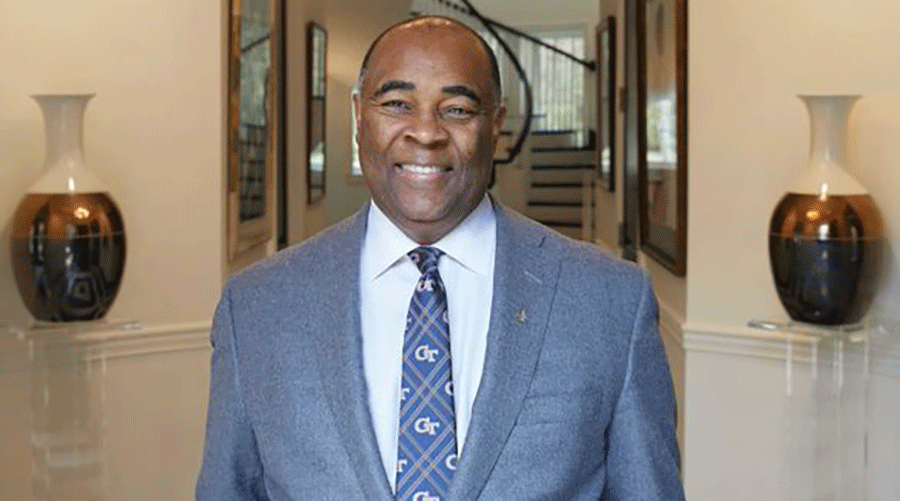 Robert Dixon knows a thing or two when it comes to giving back and staying involved in the community. Raised just a few miles from Georgia Tech, the Atlanta native carved out a career at two of the world’s most iconic companies, but also stayed an active leader in both Atlanta business and civic communities as well as maintaining his service as a proud Yellow Jacket by serving on multiple advisory boards.
Robert Dixon knows a thing or two when it comes to giving back and staying involved in the community. Raised just a few miles from Georgia Tech, the Atlanta native carved out a career at two of the world’s most iconic companies, but also stayed an active leader in both Atlanta business and civic communities as well as maintaining his service as a proud Yellow Jacket by serving on multiple advisory boards.
Dixon’s career has been influential, to say the least.
As the longest-tenured CIO in PepsiCo’s 50+ years of operation, he led the global function that delivered all information technology and information risk management solutions worldwide—a position that saw him recognized as one of the “Most Influential Black Corporate Directors” (Savoy Magazine, 2016 and 2021), a “CIO Top Ten Breakaway Leader” (Evanta, 2015), one of the “Top 100 CIO/CTO Leaders” (STEMconnector, 2015), and “Information Technology Senior Management Forum Fellow” (2020).
Prior to his career at PepsiCo, Dixon was a 30-year veteran with Procter & Gamble, concluding his career there as the vice president in the Global Business Services Organization. Dixon currently serves on four corporate boards of directors: Anthem, Build-A-Bear Workshop, Okta, and Gilbane.
Despite his career achievements, Dixon continued to remain active as a Tech alumnus, serving on the College of Computing Advisory Board, on the College of Cybersecurity & Privacy Advisory Board, and on the Foundation Board as a trustee-at-large. He recently started a second six-year tour of duty on the Georgia Tech President’s Advisory Board and remains active with the Black Alumni Organization. Dixon was recognized as a Distinguished Engineering Alumni in 2002 and was inducted into the College of Engineering Hall of Fame in 2017.
According to Dixon, giving back is just a natural part of his DNA. “My wife and I try to support the Institute with our time, talents, and treasures. Georgia Tech has done so much for me and my family in terms of the education and opening doors. It’s just fitting that I apply that spirit of philanthropy to Georgia Tech,” says Dixon.
Given all his accomplishments and activity with the Georgia Tech Alumni Association, being nominated for a Gold & White Award still came as something of a surprise for Dixon. “It was quite a surprise when Dene [Sheheane, president of the Alumni Association] called me,” Dixon remembers. “Dene explained the award’s significance, and I looked at the impressive list of previous honorees. It was really humbling to be selected for such a prestigious award, and I am deeply grateful for the recognition.”
Jay McDonald, IM 68
Serial Entrepreneur, Business Leader & Master Chair, Vistage Worldwide, Inc.
Joseph Mayo Pettit Distinguished Service Award
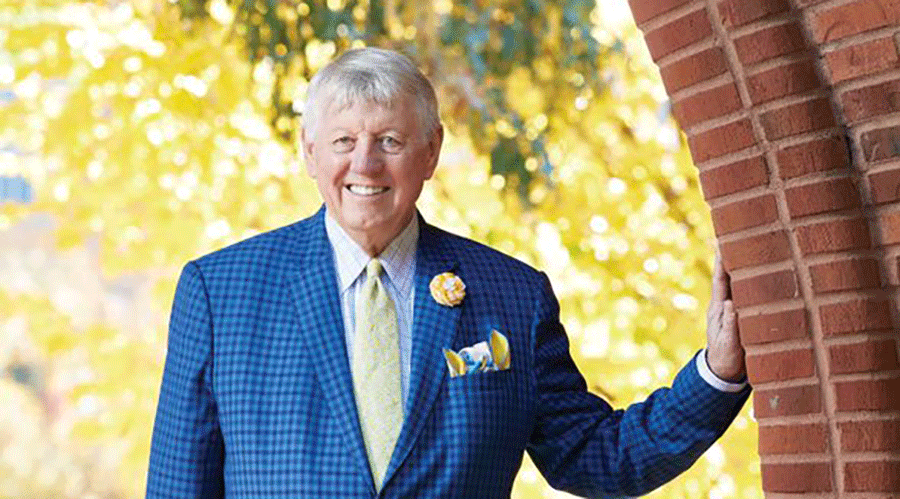 Jay McDonald switched majors from Aerospace Engineering to Industrial Management on his first day at Tech. “I walked in and saw students drawing engines and fuselages and decided that I didn’t want to do that all day. I thought I’d be better suited to people and business.”
Jay McDonald switched majors from Aerospace Engineering to Industrial Management on his first day at Tech. “I walked in and saw students drawing engines and fuselages and decided that I didn’t want to do that all day. I thought I’d be better suited to people and business.”
With more than 40 years’ experience leading and owning five successful companies, it’s safe to say that McDonald proved his college-age-self correct. Alongside an impressive career in business, McDonald has built an even more impressive reputation as an advisor, thought-leader, and mentor. With two books on leadership and corporate banking and a series of seminars for executives, McDonald is committed to helping others succeed both personally and professionally. A master chair with the executive coaching organization Vistage Worldwide, Inc., McDonald’s passion for mentorship was inspired by those who offered guidance early in his career. “I know that every opportunity over the years has come from people who have mentored, supported, and recommended me,” McDonald says.
McDonald is past president of the Cherokee Town and Country Club as well as an original member of the Georgia Governor’s Council for Science and Technology Development. Deeply committed to his alma mater, he has served as a member of the Alumni Association Board of Trustees, Georgia Tech Foundation Board of Trustees, and the Scheller College of Business Advisory Board, and as president of the Alumni Association Board. He is an avid Tech fan, attending most home games, many ACC tournaments, and countless events supporting Tech’s teams. In fact, McDonald’s affinity for Tech might even exceed his business acumen, according to a story from when he was president of The Wayne Watson Company, Russell Athletics’ distributor to the Southeast.
McDonald received a call from Tech’s basketball coach at the time, Bobby Cremins, who needed help choosing new gold uniforms for the team. After McDonald offered nine different swatches of different fabrics and color options, the team took the court that year in shiny gold uniforms, deemed by a Dallas sports reporter to be the best-looking uniforms in the nation. That year, the Yellow Jackets won their first ACC championship and the uniforms were featured on the cover of Sports Illustrated and Russell Athletics’ catalog. At a distribution event, McDonald had the unfortunate task of handing the catalog to a coach and his wife from a certain university in Athens. Their reaction was what you might expect.
“I love Georgia Tech, and I guess I love it enough to lose business over it,” McDonald jokes.
Mike Messner, CE 76
Co-CEO & Portfolio Manager, Seminole Management Company, Inc. (Retired)
Joseph Mayo Pettit Distinguished Service Award
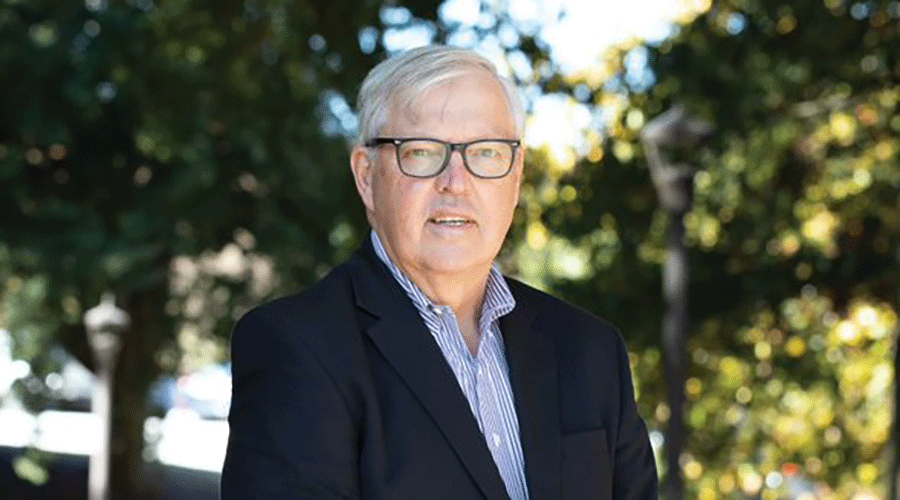 Civil engineering might not seem like the ideal background for a successful career on Wall Street, but Mike Messner is here to prove you wrong.
Civil engineering might not seem like the ideal background for a successful career on Wall Street, but Mike Messner is here to prove you wrong.
Having founded the profitable hedge-fund Seminole Capital and led it for 23 years before his retirement, Messner says more than any formal financial education, his undergraduate degree from Georgia Tech set him up for success.
“I often say that more civil engineers should think about careers like this. Civil engineers build things that last a very long time. Having that long-term perspective is a very good way of looking at investing—or really any set of problems.”
With his wife, Jenny, the Messners’ philanthropic giving has contributed significantly to the enrichment of the sciences, culture, and community. They founded the Speedwell Foundation, which provides full study abroad scholarships to students in central Pennsylvania and supports efforts to restore and expand public parks and green spaces in major U.S. cities. The Messners’ support also made possible a new, one-of-a-kind, solar-powered endangered species carousel at the Smithsonian National Zoo. The carousel includes hand-carved and hand-painted representations of endangered species, with one exception—a yellow jacket.
The Messners were also early supporters of the G. Wayne Clough Georgia Tech Promise Program and supporters of the Frederick Law Olmsted Professorships in the School of Civil and Environmental Engineering. Giving back to Georgia Tech has been a central part of Messner’s life, and his support is helping the Institute maintain its position as a leader in higher education by recruiting and retaining outstanding faculty. In 2018, Messner launched the Messner Faculty Endowment Challenge, which supports the School of Civil and Environmental Engineering through dollar-for-dollar matching, up to $5 million, for endowed faculty chairs. He has also supported the Rafael Bras Scholarship Endowment. Messner, a member of The Hill Society, has also served on the Georgia Tech Foundation Board of Trustees and the Civil and Environmental Engineering Advisory Board.
He is currently a Professor of the Practice for the Scheller College of Business and the School of Civil and Environmental Engineering, where he teaches courses on management and civil engineering to the next generation of problem-solvers.
“When you grow up in Atlanta, you know that Georgia Tech is a really good school, but it’s not until you go away that you realize how important that education has been,” Messner says. “And the model of ‘Progress and Service’ is just as good a model as you can have for any university.”
Messner’s outstanding contributions to the Georgia Tech community are a clear example of the Institute’s model of “Progress and Service” at work.
Rafael L. Bras
K. Harrison Brown Family Chair and Professor
Honorary Alumni
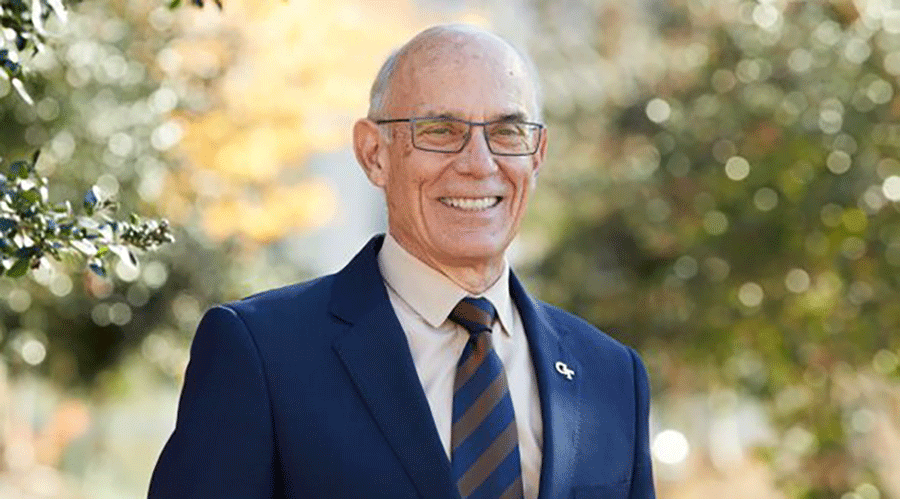 The field of hydrology is almost unrecognizable today versus what it looked like when Rafael L. Bras graduated in 1972.
The field of hydrology is almost unrecognizable today versus what it looked like when Rafael L. Bras graduated in 1972.
“Everything has changed so fast that what I learned originally is now wrong. It’s been a great time to be a hydrologist,” Bras says.
Granted, Bras played a large part in the field’s evolution over the last five decades. His research in ecohydrology—or as he describes it, “the close waltz between the water cycle, the Earth’s surface, vegetation, and the atmosphere,”—has contributed to modern hydrology, which today acknowledges the interaction between land masses and the atmosphere at a much more global scale than previously.
Bras’ research and consulting work has taken him around the world, from studying the impact of deforestation in the Amazon to advising on flood control in Venice to investigating how the rain forest in Puerto Rico (where he was born) responds to and recovers from hurricanes. He maintains an active international consulting practice alongside mentoring and teaching the next generation of scientists, who will go forth to transform the field even further.
Bras earned his bachelor’s, master’s, and D.Sc. from the Massachusetts Institute of Technology, where he also spent 32 years in the faculty of the departments of Civil and Environmental Engineering and Earth, Atmospheric, and Planetary Sciences. Among many awards, Bras is an elected member of the U.S. National Academy of Engineering, the Academy of Arts and Sciences of Puerto Rico, and the Academies of Science and Engineering of Mexico. He was distinguished professor and dean of the Henry Samueli School of Engineering at the University of California, Irvine.
In 2010, Bras came to Tech to serve as the Institute’s provost and executive vice president for Academic Affairs. “I was convinced that Georgia Tech presented a profile of a university that was willing to take risks and was on the right trajectory. I wasn’t disappointed,” he says.
Under Bras’ leadership, Tech opened the Shenzhen campus in China, launched the successful Online Master of Science in Computer Science program, adjusted the academic calendar, and reimagined the modern university library through the Library Next initiative. He also launched Arts@Tech, which has brought a new degree of creativity to curriculum and to campus spaces.
In 2020, he stepped down as provost, remaining a professor at the Institute.
“Being provost was one of the most fun times of my life. It not only allowed me to work with very bright people, but to help an institution that had a culture of excellence and of risk taking, which resonated with me.”
Reginald DesRoches
Eighth President of Rice University
Honorary Alumni
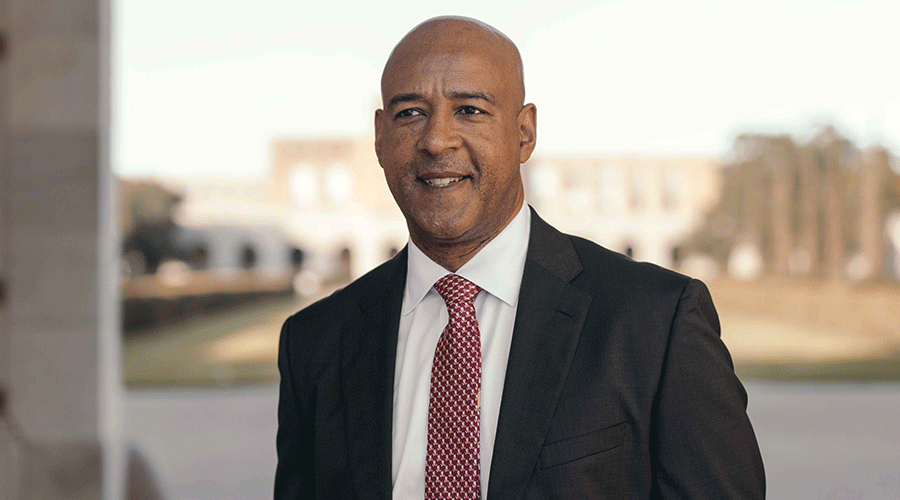 Growing up, Reginald DesRoches had all the traits of a destined engineer—he was good at science and math and always tinkering. But the “A-ha” moment that made him want to become a civil engineer was literally Earth-shaking.
Growing up, Reginald DesRoches had all the traits of a destined engineer—he was good at science and math and always tinkering. But the “A-ha” moment that made him want to become a civil engineer was literally Earth-shaking.
In 1989, he was a mechanical engineering student at the University of California, Berkeley, when he experienced his first major earthquake. “It got me completely fascinated with earthquakes,” DesRoches says. “As an engineer, it got me thinking about why some things collapse and some don’t.” That curiosity drove him to become a civil engineer and expert in seismic risk engineering.
Building better, stronger structures doesn’t end with his research. As a leader in higher education, DesRoches makes organizations stronger, too. Since July of 2020, he has served as the provost of Rice University. This November, DesRoches was named Rice’s eighth president. When he takes office, he will become the first Black person and first immigrant to lead the university.
Born in Haiti, DesRoches returned to his country of birth in 2010 to lead a team of engineers as part of response efforts following one of the country’s most catastrophic earthquakes. The experience reinforced why engineering matters, he says.
“I had been to various earthquake sites before, but I’d never seen anything like the earthquake in Haiti,” DesRoches says. “It emphasized the work that we do as engineers. That really brought home to me the importance of building things safely.”
In 1998, DesRoches joined Georgia Tech’s faculty as an assistant professor. He rose quickly through the ranks to become the Karen and John Huff School Chair and Professor of Civil and Environmental Engineering. During his time at Tech, DesRoches oversaw significant changes to the school, including the complete renovation of the civil engineering building, a rise in the number of endowed chairs, and the increase in the school’s graduate rankings to No. 2 in the country (U.S. News & World Report).
As he looks ahead to the future of Rice University, DesRoches says he’ll take a page from Georgia Tech’s playbook.
“Tech is absolutely a leader in the areas of diversity, equity, and inclusion, which is a major focus for us at Rice,” he says. “Tech also has one of the best research reputations in the world. In a way, we’re at the early stages of what I saw Tech doing while I was there, in terms of becoming the research powerhouse that it is today. I’d like to see Rice get there, too.”
Among numerous recognitions and awards, DesRoches was elected to the National Academy of Engineering in 2020, received the Presidential Early Career Award for Scientists and Engineers in 2002, and is a fellow of the American Society of Civil Engineers.
Jane Stoner
Former Senior Manager of Alumni Networks
Honorary Alumni
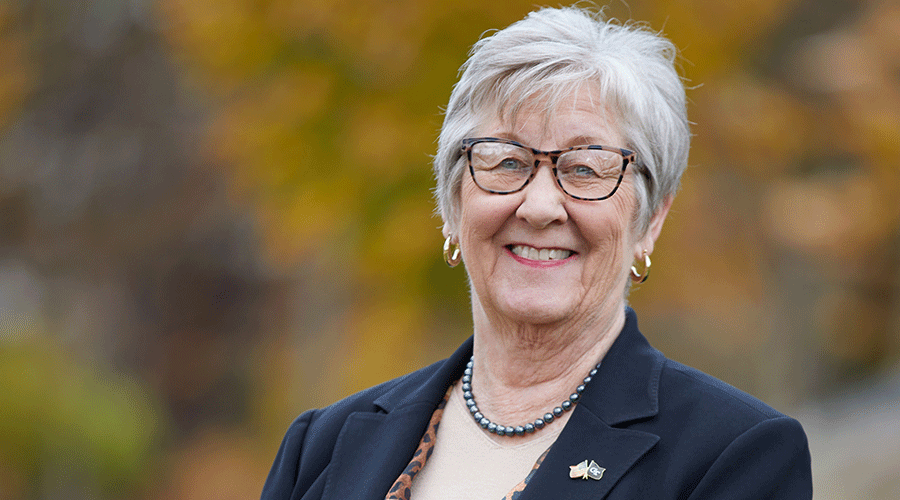 There are certain people who set the standard for service to Georgia Tech and to the alumni community. Jane Stoner is a golden example.
There are certain people who set the standard for service to Georgia Tech and to the alumni community. Jane Stoner is a golden example.
You might assume that Stoner was already an alumna—with a husband (Joe Stoner, ChE 66), daughter (Lelia Conlin, CE 97), and son-in-law (Mark Conlin, CS 99, MBA 04) who are all Tech grads, it certainly runs in her family. But what most stands out to alumni who have met Stoner during her years of service working at the Alumni Association and at Georgia Tech is her unwavering support and love for the Institute and its people.
“I’m thrilled to become part of the Georgia Tech community as an honorary alumni,” Stoner says. “But I couldn’t have been successful had it not been for the support of the Alumni Association and campus staff as well as alumni, especially those network leaders who I worked with over the years. It was a career that I loved.”
Stoner grew up in Madison, Georgia, where college fans wore “mostly red and black,” so it wasn’t until she met her husband that she was introduced to the white and gold. When the two moved to New Jersey, they became involved in the alumni network in the area. Joe became co-chair, but Stoner essentially ran the club.
She was so successful at what she did, that when a position opened up in Atlanta to support alumni networks across the country, she was the obvious choice. Over the next 15 years, she coached and mentored alumni on how to start alumni networks, successfully strengthening the alumni network system to over 100 active groups. She is most proud of growing the number of networks with endowed scholarships as well as her role in getting many of the Association’s most innovative programs off the ground. That includes “Team Buzz Day,” a day of community service that alumni networks and students continue to host each year, and Mentor Jackets, which launched in 2004.
“I remember sitting on the [Alumni House] ballroom floor with board member Tom Davenport that first year of Mentor Jackets. We had 50 student and 50 alum applications, and the two of us matched them all,” Stoner says.
Since its inception, Mentor Jackets has successfully connected thousands of alumni and students and garnered numerous national awards.
Following the Alumni Association, Stoner joined the Office of Admissions and worked with Tech’s Women’s basketball program before retiring.
For many alumni who couldn’t return to Atlanta, Stoner became the face they associated with Tech—a role she’s maintained even years after her official retirement. “It’s been so rewarding to stay in touch with alumni and to see students who I worked with graduate and stay involved with Tech,” she says.